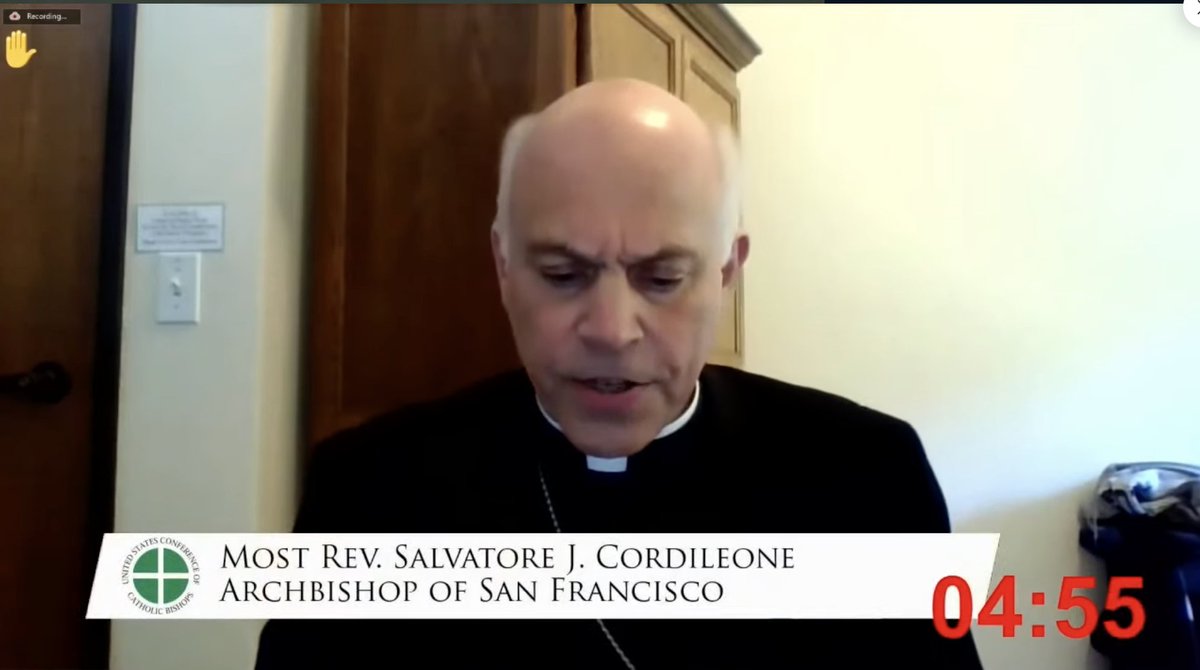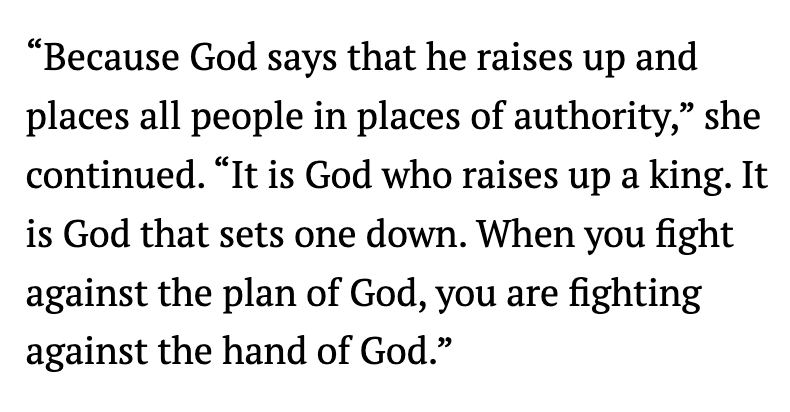Day 2 of the US Catholic bishops meeting—which will involve discussion of the Eucharist (and presumably whether it should be denied to politicians back abortion rights)—has begun.
The Eucharist convo likely isn't happening for a while, though, so sit tight. #USCCB21
The Eucharist convo likely isn't happening for a while, though, so sit tight. #USCCB21

Oh: In a convo on a Native American/Native Alaskan ministry statement, Bishop Lucia brings up examining the Doctrine of Discovery.
As I note in American Prophets, DoD has come up a lot recently, and Indigenous activists have asked Pope Francis to revoke it (he hasn't). #USCCB21



As I note in American Prophets, DoD has come up a lot recently, and Indigenous activists have asked Pope Francis to revoke it (he hasn't). #USCCB21




Bishop Tyson says he isn't convinced on Eucharist vote yet, asks: "To what extent is this discussion really just about making a point on abortion, to the exclusion of other issues?”
Rhoades says doc would also involve ppl who human traffic back, white supremacy, etc. #USCCB21
Rhoades says doc would also involve ppl who human traffic back, white supremacy, etc. #USCCB21

Cupich calls out the subtext, points to bishops who have intimated that "this is about worthiness of communion for elected officials."
Says of subtext re denying Communion to Pelosi, Biden, etc: "I don't know how we get around that" if Eucharist doc passes. Doesn't support rez.
Says of subtext re denying Communion to Pelosi, Biden, etc: "I don't know how we get around that" if Eucharist doc passes. Doesn't support rez.

Bishop DeGrood voices what sounds like support for the resolution and says "scandal" has already happened because bishops *haven't* already issued a statement. 

Bishop McElroy, who has railed against "weaponizing" the Eucharist, warns moving forward could make the Eucharist "a tool in the vicious partisan turmoil."
Says it will make "the sacrament that seeks to make us one will become, for millions of Catholics, a source of division."
Says it will make "the sacrament that seeks to make us one will become, for millions of Catholics, a source of division."

Bishop Naumann: "I'm somewhat amused by those who say we're rushing into this. We do nothing quickly as a conference."
Suggest the discussion is not just about abortion, then talks about abortion, then talks about Biden and abortion specifically. #USCCB21
Suggest the discussion is not just about abortion, then talks about abortion, then talks about Biden and abortion specifically. #USCCB21

Bishop Wester says bishops shouldn't pursue the document, because it will be perceived as partisan.
"Rather, I believe we should consider a brief pastoral reflection on what it means to be the body of Christ," he says, referencing the pandemic.
"Rather, I believe we should consider a brief pastoral reflection on what it means to be the body of Christ," he says, referencing the pandemic.

Rhoades responds, saying he won't retract the doc.
Archbishop Cordileone, who has voiced support for denying communion to pols who back abortion rights, then speaks in favor of the motion.
Says it will be a resource for bishops, and that bishops' "credibility is on the line."
Archbishop Cordileone, who has voiced support for denying communion to pols who back abortion rights, then speaks in favor of the motion.
Says it will be a resource for bishops, and that bishops' "credibility is on the line."

Bishop Medley, says "we have lost the narrative" on the document.
"All they're reporting on ... is this little section on Eucharistic consistency." (Note: The bishops also keep bringing this up on their own.)
Says doc needs "clarification" if it's going to proceed. #USCCB21
"All they're reporting on ... is this little section on Eucharistic consistency." (Note: The bishops also keep bringing this up on their own.)
Says doc needs "clarification" if it's going to proceed. #USCCB21

Bishop Stowe weighs in: Says repeated conversation about Biden suggests "we're not in a place" to have a "serene and extensive" discussion and discernment on the document.
Says he opposes document, says committee is "already ambiguous about the purpose of the document."
Says he opposes document, says committee is "already ambiguous about the purpose of the document."

Cardinal Wilton Gregory, who has said he would give Biden communion, invokes Vatican letter asking bishops to go slowly on vote.
“We need to spend time ... in straightforward, candid conversation together … prior to taking the next steps toward any statement or plan of action.”
“We need to spend time ... in straightforward, candid conversation together … prior to taking the next steps toward any statement or plan of action.”

Cardinal DiNardo speaks in favor of the document, says "my interest in this document is partly on the mystery celebrated and the mystery believed." 

Archbishop Kurtz: says he's "inclined to vote in favor" of the document.
Says he was "happy to hear" that the document isn't a policy, but "a teaching foundation."
Says he was "happy to hear" that the document isn't a policy, but "a teaching foundation."

Bishop Knestout accuses the media — and specifically the Washington Post (sounds like @mboorstein's excellent piece) — of "politicizing" this Eucharistic debate.
Note: bishops themselves have *repeatedly* invoked political elements/politicians here, including today. #USCCB21
Note: bishops themselves have *repeatedly* invoked political elements/politicians here, including today. #USCCB21

FTR @mboorstein's piece was fantastic and you can read it here. washingtonpost.com/religion/2021/…
Archbishop Jackels speaks out against the document, suggesting it's unnecessary. "I would not support writing another document." 

Bishop Bambera notes Vatican letter called for a lot of dialogue (including consulting w/other episcopal conferences), says it isn't clear if those steps have been taken.
Says it's important to show "unity with the Holy See" & follow protocols of the letter. Unlikely to support.
Says it's important to show "unity with the Holy See" & follow protocols of the letter. Unlikely to support.

Bishop Biegler: Notes bishops have issued statements about politicians, calling into the Q the section on "Eucharistic consistently."
"If our efforts end in fomenting discord in the church, we will have failed."
Says he'll vote against unless EC section removed.
"If our efforts end in fomenting discord in the church, we will have failed."
Says he'll vote against unless EC section removed.

Bishop Soto: "The Eucharist should not be defined by the realities that we're facing right now, particularly the political rancor." 

Bishop Paul Etienne: "This topic, this cherished source of our life and charity and unity, is now enmeshed in a conversation about politics. That's a very difficult place for us to be."
Again points to issues with the "eucharistic consistency" portion of the document.
Again points to issues with the "eucharistic consistency" portion of the document.

Archbishop Paul Coakley: "I think the Lord is calling us to trust that he is with us, that he is guiding us."
Says he's "strongly in favor" of supporting the "teaching document" on the Eucharist.
Says he's "strongly in favor" of supporting the "teaching document" on the Eucharist.

Bishop James Wall: "I don't see this as political. I see this as pastoral."
Says he will vote in favor.
Says he will vote in favor.

Bishop David Konderla speaks in favor of the motion.
Says the document could help deepen people's appreciation of the Eucharist.
Says the document could help deepen people's appreciation of the Eucharist.

Bishop Shawn McKnight: "It's apparent to me that there is a division in the conference ... in the context" and the "content" proposed in the document.
"What I see in writing is not just a teaching document, it's a document that addresses discipline."
"What I see in writing is not just a teaching document, it's a document that addresses discipline."

Bishop Robert Coerver says the "political narrative got started" in November when bishops talked about responding to the new administration.
Calls for regional or provincial meetings, says "there seems to be a rush to this" but the holy spirt and church doesn't work that way.
Calls for regional or provincial meetings, says "there seems to be a rush to this" but the holy spirt and church doesn't work that way.

Bishop Felipe Estevez says there is "unanimity" on the "protection of the unborn" among bishops, says he'll recommend to move forward "with confidence."
(His remarks echo recent ones he made to RNS) religionnews.com/2021/06/11/wha…
(His remarks echo recent ones he made to RNS) religionnews.com/2021/06/11/wha…

Bishop Thomas Daly brings up politicians, says, "I think it is a time for us to clarify...we are the shepherds and teachers of these elected officials." 

Bishop Edward Clarke says bishops should take responsibility for the fact that "we know how this will be perceived."
Says he personally prefers to look at the issue of Catholics not believing in Christ's "real presence" in the Eucharist.
Says he personally prefers to look at the issue of Catholics not believing in Christ's "real presence" in the Eucharist.

Bishop Larry Silva: "I think we need to teach what is right, but in the end, I think we need to let the Lord sort it out." Says bishops don't need to be the "police" on the Eucharist issue.
Says regional or provincial discussions "would be helpful."
Says regional or provincial discussions "would be helpful."

Bishop Donald Hying speaks in favor of the document, says he speaks to people who are "concerned and confused" that Biden is a Catholic.
Says bishops should "impress leaders to conversion" on life issues.
Says bishops should "impress leaders to conversion" on life issues.

Cardinal Joseph Tobin challenges the "eucharistic consistency" part of the document, says it revolved around a profoundly divisive question, notes the Vatican has raised questions about the topic and its speed.
"Voting in the affirmative will produce a document, but not unity."
"Voting in the affirmative will produce a document, but not unity."

Archbishop Bernard Hebda calls the debate the most robust discussion he's seen in his 10 years as a bishop. 

Kalabat backs the motion.
Meanwhile, Bishop John Folda speaks against the idea of removing the "eucharistic consistency" portion of the document.
Says it doesn't need to single out specific people/groups, but "I don't think we should dodge that issue."
Meanwhile, Bishop John Folda speaks against the idea of removing the "eucharistic consistency" portion of the document.
Says it doesn't need to single out specific people/groups, but "I don't think we should dodge that issue."

Archbishop Hartmayer of Atlanta: Invokes Pope Francis saying "Who am I to judge?"
Says "none of us is truly worthy to receive the ... gift of the father ... the church needs to welcome and feed the hungry, and allow the grace of the sacrament to ... change the hearts."
Says "none of us is truly worthy to receive the ... gift of the father ... the church needs to welcome and feed the hungry, and allow the grace of the sacrament to ... change the hearts."

Hartmayer says he wants a document, although it's unclear what exactly he wants from it.
The Bishops are voting. Gomez says final results will be announced tomorrow, and that the measure only requires a simple majority to pass.
Full story: religionnews.com/2021/06/17/in-…
• • •
Missing some Tweet in this thread? You can try to
force a refresh









